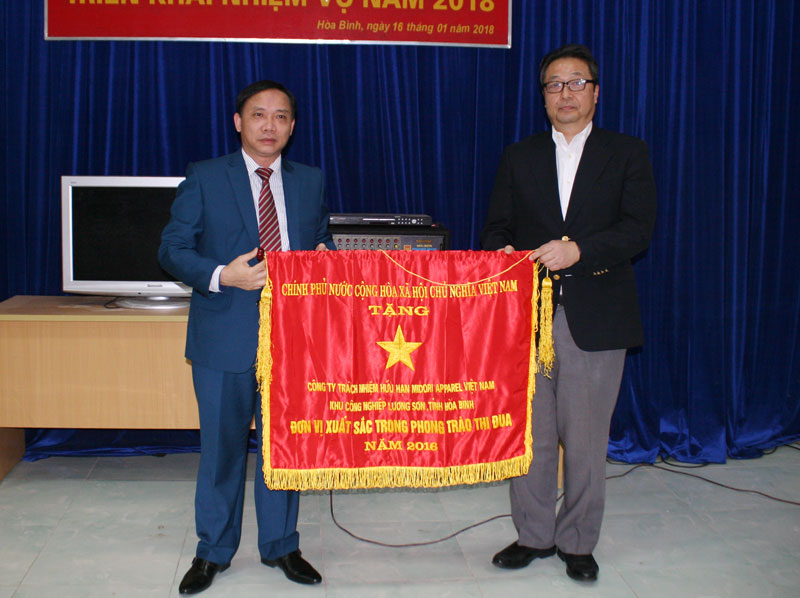
(HBO) – The provincial Management Board of Industrial Zones (IZs) held a conference to review activities of 2017 and launch tasks for 2018. Attending the event was Vice Chairman of the provincial People's Committee Bui Van Khanh.
Bui Van Khanh, Vice Chairman of the provincial People's Committee, presents the government’s flag of emulation to Midori Vietnam Ltd company.
In 2017, the IZ Management Board worked with departments and agencies on effective State management of industrial zones, exceeding the set targets. Enterprises in the industrial zones operated smoothly, achieving the targets of higher industrial production and export values compared to the previous year. In 2017, there were 14 new investment projects, reaching 233.3 percent of the plan, three of them went into operation. Firms earned 12.050 trillion VND (530.2 million USD) in revenue and 511 million USD from exports, added 136 billion VND to the State budget, generated jobs to 1,800 workers, raising the total number of workers to 16,320. Last year, the board’s trade union activities improved with better working conditions and welfares to workers.
In 2018, the board will strive to completely fill occupancy of Luong Son industrial park and the left bank of Da River and 30 percent of occupancy of Mong Hoa, Yen Quang and Nam Luong Son industrial zones while completing necessary infrastructure items in Mong Hoa industrial park and offering 50 ha of land for investment attraction. It will also provide help for firms to do business effectively.
Speaking at the event, Vice Chairman Khanh hailed the board and enterprises in industrial parks for their contributions to the provincial socio-economic development.
He asked the board to partner with departments and agencies to clear difficulties and attract resources to invest in IZ infrastructure, create land base for investment attraction, well manage planning in service of shifting to sustainable economic structure./.
Hoa Binh province is undergoing a dynamic transformation amid Vietnam’s national digital transition. Building on Poliburo’s Resolution No. 57-NQ/TW on breakthroughs in science, technology, innovation, and national digital transformation, the province has rolled out a wide range of practical action plans. A standout initiative is the "Digital Literacy for All” movement, an effort to ensure that no one is left behind in the digital era.
Hoa Binh province is undergoing a dynamic transformation in the wake of the national digital transformation movement. Building on Resolution No. 57-NQ/TW of the Politburo on breakthroughs in science, technology, innovation, and national digital transformation, the province has implemented a wide range of practical action plans. A standout initiative is the "Digital Literacy for All” movement ambitious effort to ensure that no one is left behind in the digital age.
With a spirit of unity and proactive problem-solving, the Party Committee, the government and the people of Dong Lai Commune (Tan Lac District) have made great strides in implementing the resolutions of the 24th Party Congress of the commune for the 2020 - 2025 term. Focusing on leadership and practical actions, the commune has brought the Party’s resolutions into daily life, creating strong impacts and pushing the local development forward.
Amid the nationwide push for digital transformation, young people in Hoa Binh Province are stepping up as dynamic pioneers, applying technology to enhance Youth Union operations and expand the reach of youth-led initiatives. Through creativity and adaptability, Youth Union organizations at all levels have introduced a series of practical solutions, contributing to modern governance and community development.
In recent years, An Nghia commune, located in Lac Son district, has stepped up administrative reform, focusing on improving the quality and efficiency of its single-window service unit for receiving and processing administrative procedures. These improvements have helped create favourable conditions for local residents and organisations to handle administrative procedures, contributing to the commune’s broader socio-economic development.
The Prime Minister-approved master plan to develop the multi-use value of forests ecosystems through 2030, with a vision to 2050, aims to improve the management and sustainable use of forest resources, create jobs, increase incomes, and improve the living standards of ethnic minorities, people in mountainous and remote areas, forest workers and those living near forests.



